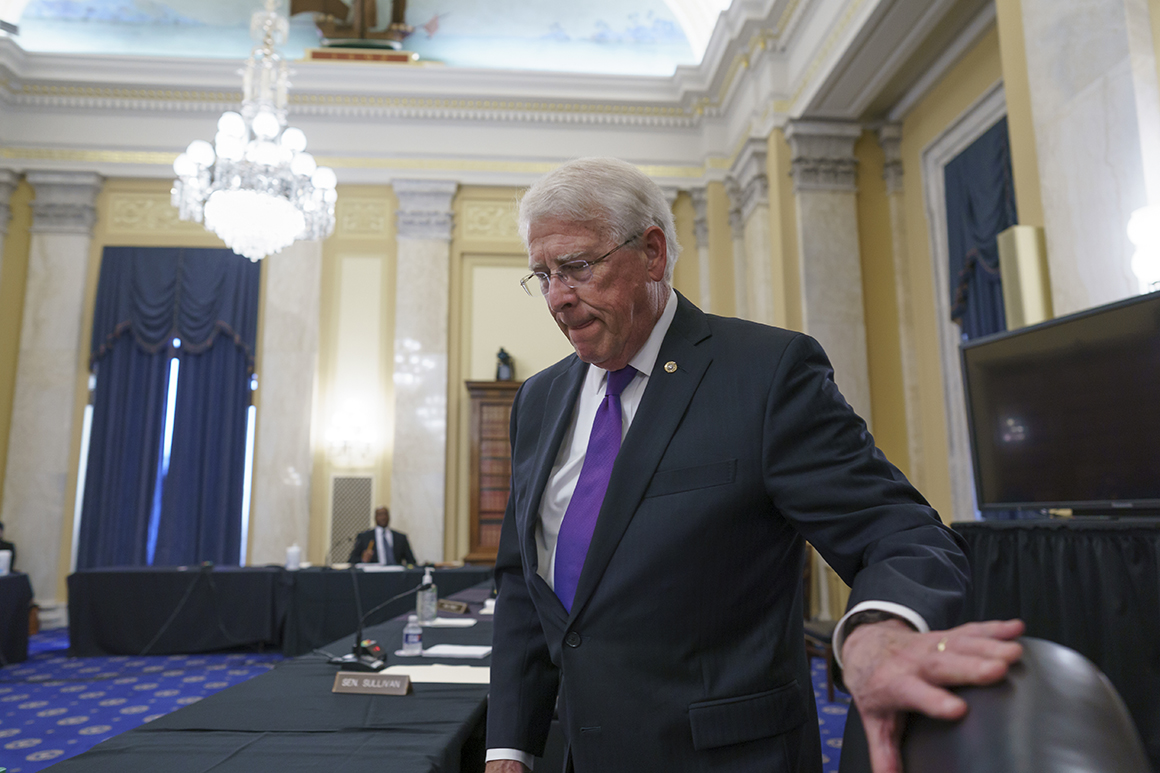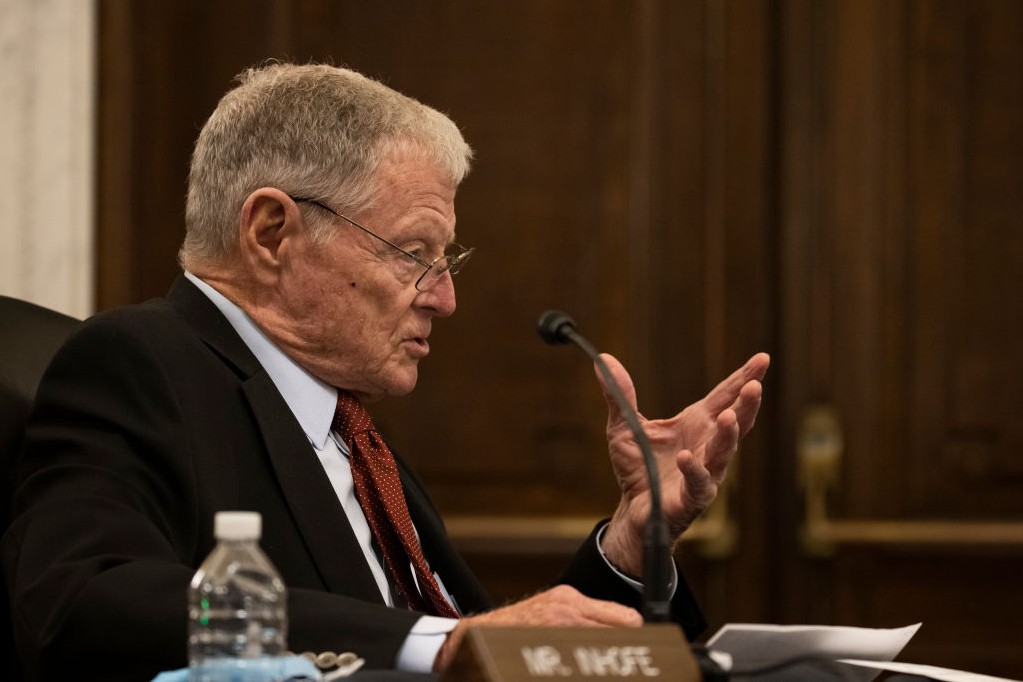
Democrats had big plans this year when they took full control of Washington, D.C. — before political reality got in the way. For proof, look no further than this year's Pentagon policy bill.
The compromise National Defense Authorization Act that lawmakers are poised to send to President Joe Biden as soon as this week includes several wins for conservatives, and more than a few losses for the left.
Bipartisan provisions requiring women to register for the draft, cracking down on Saudi Arabia and imposing sanctions on Russia were nixed; legislation repealing outdated Iraq war authorizations fell by the wayside; reforms to the military justice system and efforts to combat extremism in the ranks were pared back; and a proposal to give Washington, D.C., control of its National Guard was dropped.
Democrats hold power in the House, Senate and White House for the first time in more than a decade, yet the high-profile defense bill got more GOP votes than from Biden’s own party. As progressive lawmakers made their dissatisfaction with the bill's high price tag clear, centrist Democrats knew they needed Republican support to pass the House and Senate.
That dynamic underscores the disconnect between the sky-high expectations for Democrats and the reality of their ultra-slim majorities in Congress, which have often required them to get buy-in from Republicans in order to approve high-profile legislation.
“Historically, the defense bill has not been a vehicle for progressive change. And I think that holds here,” said Sen. Brian Schatz (D-Hawaii), the upper chamber’s chief deputy whip. “This is a function of the 50-50 Senate, and the filibuster existing.”
And the GOP is emboldened enough to dig in hard from the minority: Republicans blocked a package of amendment votes last week, forcing House and Senate negotiators to work out a consensus version of the defense bill to ensure it could pass by year’s end — a benchmark that Congress has almost always met.
Republicans were particularly elated that negotiators removed gun-control language from the bill, boosted the top-line spending number by $25 billion for a total of $740 billion for the Pentagon and prohibited troops from being dishonorably discharged solely for refusing the Covid-19 vaccine.
“There were several real sticks of dynamite that were defused,” said Sen. Roger Wicker (R-Miss.), an Armed Services Committee member. “And I’m glad we substantially increased Biden’s defense proposal on a bipartisan basis.”

Sen. Elizabeth Warren (D-Mass.), who typically votes against the annual defense bill, slammed the compromise package for its “failure to include a robust response to sexual violence and to deal with extremism in the military.”
“And I’m concerned about what got left in, and that is an additional $25 billion in defense spending that the White House didn’t even ask for,” Warren said in a brief interview. “I think both of those are wrong.”
GOP lawmakers cheered the final product — namely what was dropped from the compromise.
“I worked closely with my colleagues to strip out several radical progressive priorities," said Rep. Mark Green (R-Tenn.).
And Rep. Andrew Clyde (R-Ga.), a member of the hardline House Freedom Caucus, applauded the GOP negotiators for their efforts to “remove the poison pills that, as a staunch conservative, I could never support.”
The top Republican on the Senate Armed Services Committee, Jim Inhofe of Oklahoma, touted that "there is much in this bill for conservatives."
The House passed the defense compromise late Tuesday in a blowout 363-70 vote, with 194 Republicans and 169 Democrats backing it. That’s over 90 percent of the GOP Conference and just three-quarters of the Democratic Caucus. It’s also a shift from when the House passed its own bill in September, when significantly more Democrats than Republicans backed the legislation.
Ahead of the bill’s passage in the House on Tuesday evening, Republicans cheered the exclusion of the draft expansion, a proposed Pentagon office to combat extremism and a “red flag” provision GOP lawmakers argued would threaten troops’ Second Amendment rights.
While many Democrats, particularly progressives, may have had higher hopes for their majorities shaping national security policy, the reality was much harsher. Democrats’ narrow majorities limited what they could ultimately get in a final defense agreement that could pass both chambers.
When asked about the criticisms from progressives, Senate Armed Services Chair Jack Reed (D-R.I.) replied: “I think it’s a great bill.”

House Armed Services Chair Adam Smith (D-Wash.) urged lawmakers to focus on the many provisions that made it into the bill rather than what didn't make the cut.
“It’s a good bill. It's not perfect. Every single person has something in it they don't like and something that didn't get in it that they wished had,” Smith said Tuesday. “And we managed to get a deal together that I think creates an outstanding piece of legislation that upholds our responsibility … as a Congress.”
With just an eight-vote majority in the House and a large group of progressives who vote against the legislation's high price tag each year, Democratic leaders needed GOP votes to clear their own version of the bill in September as well as the final agreement.
Republicans held an even bigger trump card in the 50-50 Senate, where 60 votes are needed to pass legislation. That hurdle ultimately spelled doom for Majority Leader Chuck Schumer’s efforts to pass the Senate’s own bill when Republicans stalled the legislation last week amid a dispute over amendment votes. Many of those amendments, if adopted, would have made the bill more amenable to progressives.
Progressive lawmakers in the House and Senate this year pushed to hold the line on defense spending and even exact cuts to the Pentagon budget and redirect the savings to other pressing needs.
Yet other Democrats sided with a Republican push to boost Biden’s defense request by $25 billion aimed at matching China’s military gains and outpacing rising inflation.
Advocates of more sweeping changes to the military justice system also felt left in the lurch. The final bill includes changes that would transfer decisions to prosecute sex crimes and related offenses — such as kidnapping, manslaughter and murder — to special prosecutors outside of the military chain of command.
But it falls short of the overhaul pursued by Sen. Kirsten Gillibrand (D-N.Y.) that would have transferred decisions involving all major crimes.
Gillibrand slammed Armed Services leaders for going against the lawmakers who backed the bipartisan proposal.
“The majority of our colleagues have recognized that our bill has the support of a bipartisan, filibuster-proof majority in the Senate and a majority in the House,” Gillibrand said. “But the will of those members was ignored in the NDAA, where committee leaders stripped out reforms from the bill behind closed doors, despite assurances that they would follow regular order.”
Even Sen. Josh Hawley (R-Mo.) — who successfully lobbied against the provision requiring women to register for the draft — lamented that the negotiators “stripped the guts out of the sexual assault provisions.”
“It’s amazing that you can have the kind of support for a provision that Kirsten has worked to get so hard, with bipartisan support, and yet DoD, every time, succeeds in just gutting it,” Hawley said. The Defense Department supported the narrower proposal.
Rep. Anthony Brown (D-Md.), a House Armed Services Committee member, opposed the compromise bill after it dropped the wholesale military justice change and his proposal to establish a Pentagon office of countering extremism.
“At a time when Democrats control the House, the Senate and the Executive Branch, it is an unconscionable failure to deliver a National Defense Authorization Act that does not meet the values of equity and justice for which we have long strived or a bill that does not meaningfully protect the foundations of our democracy,” Brown said.
The sentiment was echoed by a trio of House Democrats spanning the ideological spectrum — Reps. Ro Khanna of California, Tom Malinowski of New Jersey and Gerry Connolly of Virginia — who came out against the final defense bill after several provisions taking aim at Saudi Arabia were left out. While the opposition from Khanna, a progressive, was not necessarily a surprise, Malinowski and Connolly trend more moderate.
The group took aim at “a small group of senators” whom they said “exercised a veto over these measures.”
"Our relationship with Saudi Arabia will not be improved if every time its rulers defy U.S. concerns, we take it upon ourselves to sweep those concerns under the rug; the burden of maintaining this relationship must be more equally shared," the three lawmakers said in a statement.
----------------------------------------
By: Andrew Desiderio and Connor O’Brien
Title: Progressives get rolled on Pentagon policy
Sourced From: www.politico.com/news/2021/12/09/defense-pentagon-policy-progressives-523964
Published Date: Thu, 09 Dec 2021 04:30:34 EST
Did you miss our previous article...
https://consumernewsnetwork.com/politics-us/jan-6-investigators-face-a-new-challenge-trump-allies-plead-the-fifth






